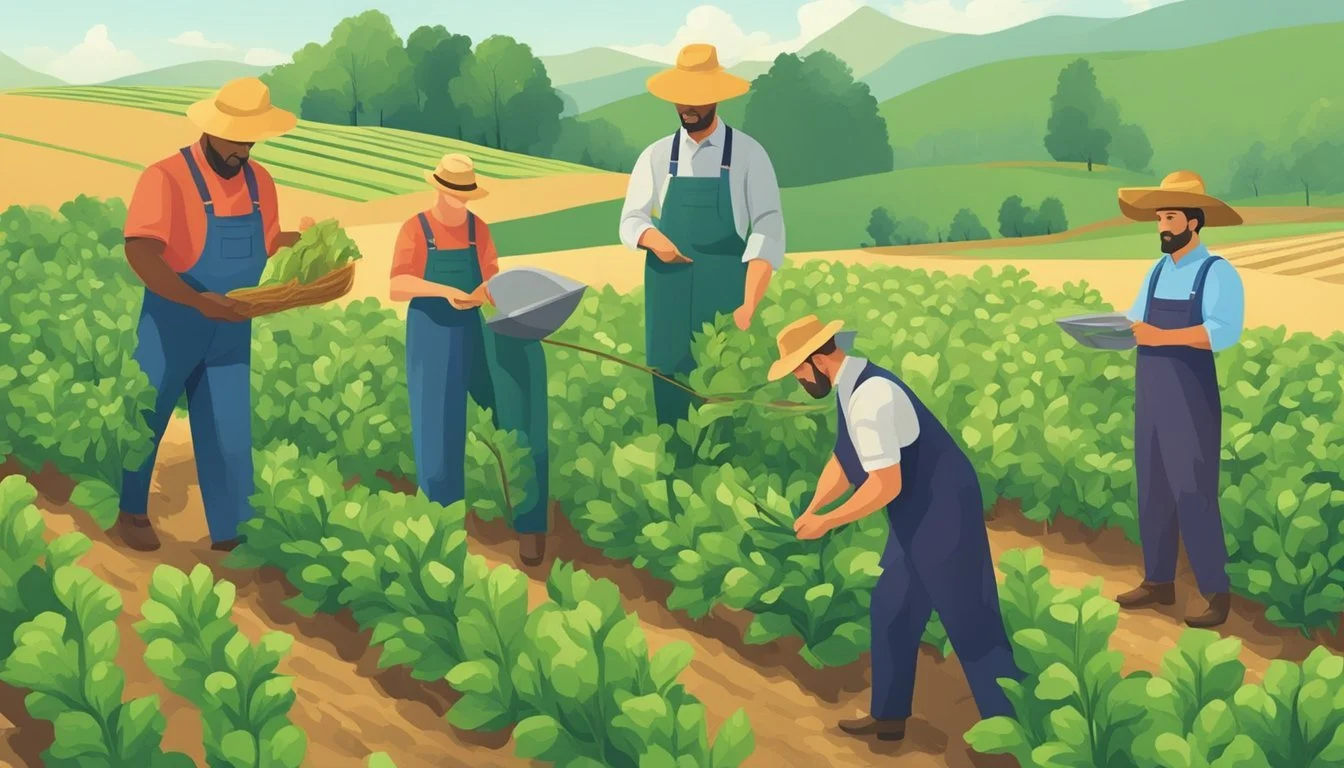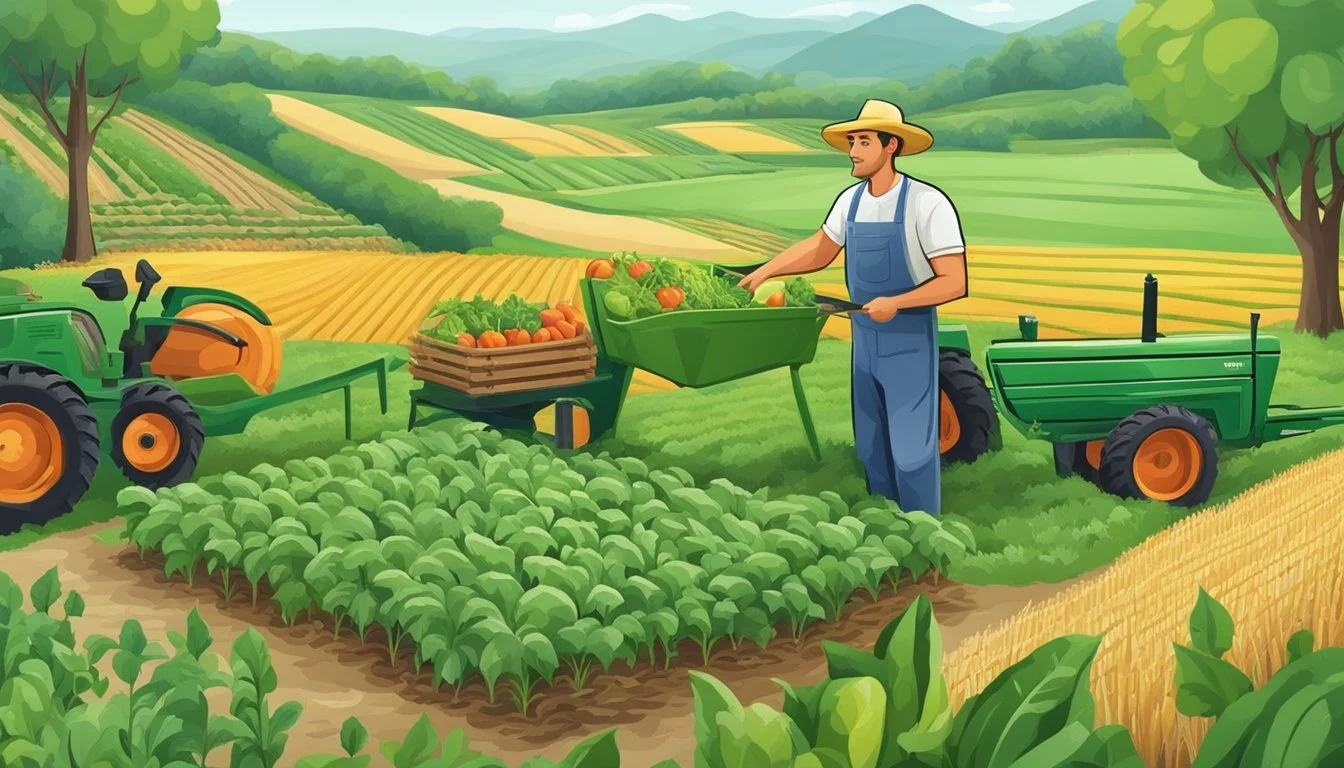Farming Grants Georgia
Navigating Financial Aid for Farmers
Agricultural producers in Georgia have several opportunities to receive financial assistance through grants, which are designed to support and improve farming practices across the state. Specialty Crop Block Grant Program, part of the initiatives by the Georgia Department of Agriculture, focuses on enhancing the competitiveness of specialty crops. With an emphasis on collaboration and innovation, this competitive solicitation process aligns with the efforts to empower local agriculture and contribute to the state's economic development.
In addition to state-level programs, federal resources such as those managed by the United States Department of Agriculture (USDA) provide grants and other forms of financial support. Southern Sustainable Agriculture Research & Education (SARE) and Rural Business Development Grants are examples of programs that periodically offer financial assistance to Georgia's agricultural sector. These grants target a range of objectives from sustainable farming practices to the development of rural agricultural businesses, ensuring that farmers have access to resources necessary for resilience and growth.
The state also addresses the broader agricultural infrastructure through the Resilient Food Systems Infrastructure Program (RFSI). This initiative, backed by the Georgia Department of Agriculture in partnership with the USDA Agricultural Marketing Service (AMS), aims at fortifying Georgia's food supply chain. By supporting agricultural producers in this manner, Georgia works to sustain its agricultural heritage and advance its position as a key player in the industry.
Overview of Farming Grants in Georgia
Georgia's agricultural sector benefits significantly from various grant programs that provide financial assistance to farmers. These grants are instrumental for fostering growth, elevating market opportunities, and supporting sustainable practices in agriculture throughout the state.
Role of the Georgia Department of Agriculture (GDA)
The Georgia Department of Agriculture (GDA) orchestrates programs aimed at bolstering the state's agribusiness through financial resources. While grants from the GDA may not generally cover start-up costs, operational expenses, or be applied to debt repayment, they do play a vital role in funding specific types of agricultural activities. Grants managed by GDA often have strict eligibility criteria that applicants must meet. One prominent grant program overseen by the GDA is the Specialty Crop Block Grant Program (SCBGP), which is designed to support projects that enhance the competitiveness of specialty crops.
Significance of USDA in Georgia's Agriculture
The United States Department of Agriculture (USDA) is a significant entity in Georgia's agricultural landscape, proposing a variety of grants and programs to support the industry. An example is the Value Added Producer Grant (VAPG), aimed at helping farmers and ranchers develop new product lines to enhance their income and market presence. The USDA also promotes innovative practices in Georgia through the Conservation Innovation Grants and has invested substantial amounts to introduce new markets for the state's agricultural products. Financial assistance from the USDA supports local businesses in rural communities to ensure opportunities for growth and sustainability.
Eligibility and Application Process
Securing farming grants in Georgia requires an understanding of the specific eligibility criteria and navigating the structured application process. Farmers and agribusinesses must meet these defined requirements to apply successfully.
Determining Eligibility for Grants
To determine eligibility for grants in Georgia, one must thoroughly review the strict eligibility criteria set forth by the grantor. Grants are typically not available for those simply wishing to begin or expand a business without meeting certain conditions. For instance, independent producers, agricultural producer groups, and farmer- or rancher-cooperatives may qualify for programs like the Value Added Producer Grants. The State and Federal grants commonly stipulate that applicants must be involved in specific types of farming or agribusiness activities and may require certain entity structures, such as family-owned operations or majority-controlled producer business ventures.
Navigating the Application Process
Once eligibility is confirmed, the next step is the application process, which comprises several critical phases:
Initial Steps: Obtain the application forms from the relevant department or online portal.
Submission Deadlines: Note that these applications have strict deadlines; for example, the Rural Business Development Grants had an application open date of January 2, 2024, with a close date of April 1, 2024.
Documentation: Prepare and compile all the necessary documentation, which often includes business plans, financial statements, and other supporting materials.
Compliance Requirements: Adhere to any specific regulatory or compliance standards as stated in the solicitation notice or grant regulations.
Contact Resources for Assistance
Potential applicants can obtain assistance by contacting the relevant department or agency offering the grant. The Georgia Department of Agriculture, for example, offers a range of resources to support applicants through the process. It is advisable to contact them directly for guidance on grant applications and to receive updates on the status of available grants, such as the ongoing work on the Georgia Farmland Conservation Fund framework. Contact information is typically available on the department's official website or through their 'Contact Us' section.
Types of Grants Available
In the state of Georgia, farmers and agribusinesses can benefit from a variety of grants designed to support the agriculture industry. These grants focus on enhancing the production and marketing of specialty crops, promoting conservation efforts, and providing marketing and educational opportunities to uplift the sector.
Specialty Crop Block Grant Program (SCBGP)
The Specialty Crop Block Grant Program (SCBGP) provides crucial funding to entities researching and developing innovative approaches for specialty crops. This encompasses projects that aim to improve crop efficiency, handling, and processing. The program also aims to expand availability and access to specialty crops, and better market and promote them to enhance competitiveness.
Conservation Programs
Conservation programs offer financial assistance to farmers who implement soil and water conservation practices on their agricultural land. These programs support projects that aim to preserve natural resources, ensure sustainable farming practices, and maintain environmental quality for future generations. Conservation grants are typically competitive and promote long-term ecological balance throughout Georgia's diverse agricultural landscapes.
Marketing and Education Grants
Marketing and Education grants are designed to provide farmers with the resources to effectively market their products and improve their operational know-how. These grants support efforts that can include developing marketing strategies for agricultural commodities, creating educational materials for the farming community, and conducting workshops that aim to enhance agricultural knowledge and practices within the state.
Financial Assistance for Diverse Groups
Georgia offers a variety of financial assistance programs aimed at supporting different groups within the farming community. These programs focus on helping beginning farmers and ranchers, veterans, minorities, and cooperatives to thrive through access to funding and technical assistance.
Support for Beginning Farmers and Ranchers
Beginning farmers and ranchers can access several grant opportunities designed to facilitate their entry into the agricultural sector. Financial support is often the cornerstone for these individuals as they navigate the early stages of business development. Assistance may come in the form of federal and state grants, as well as from local agencies and non-profit organizations.
Programs for Veterans and Minorities
Veterans and minorities within Georgia's agricultural community are recognized through targeted grant programs that promote equity in farming. These grants empower these groups by providing not just finances, but also the necessary tools and technical assistance to enhance their agricultural pursuits. Funds may be used for a range of activities, from purchasing equipment to building infrastructure.
Empowerment Through Cooperative Financing
Cooperative development centers have specific programs available that support the unique structure and financing needs of agricultural cooperatives. These centers focus on empowering socially-disadvantaged groups by providing technical assistance and funding without the requirement for matching funds. By fostering cooperative efforts, there's an enhancement of community resilience and sustainability in food production and distribution.
Innovative Programs and Research
Georgia's agricultural sector is experiencing a surge in research-focused and technology-driven initiatives aimed at enhancing sustainability and innovation. These efforts are bolstering the state's food system and contributing to a more resilient agriculture climate-smart landscape.
Research Initiatives for Sustainable Farming
The Georgia Department of Agriculture and various universities are leading sustainable farming research. Investment in initiatives such as the Specialty Crop Block Grant Program reflects Georgia's commitment to sustainability. Research focuses on areas like soil health, pest management, and resource conservation, ensuring that Georgia's farming practices are both sustainable and productive.
Key Research Areas:
Soil and water conservation
Integrated pest management
Climate-smart agricultural practices
Technology Advancements in Agriculture
Innovation in technology plays a pivotal role in Georgia's agricultural expansion. The technology advancements section encompasses the development of new tools and systems that aid local and regional producers. With financial assistance such as the Conservation Innovation Grants (CIG), stakeholders are encouraged to adopt cutting-edge technologies that lead to more efficient and environmentally sound farming methods.
Technologies Being Explored:
Precision agriculture
Automated irrigation systems
Data-driven crop management tools
Strengthening Georgia's Crop Production
Georgia's commitment to enhancing its crop production is evident through initiatives focused on supporting specialty crop producers and bolstering the infrastructure for fruits, vegetables, nuts (how long do nuts last?), and nursery operations.
Improving Fruit, Vegetable, and Nut Cultivation
Georgia's Department of Agriculture has taken significant strides in advancing the cultivation of fruits, vegetables, and nuts by allocating funds specifically for innovative research and market expansion. Specialty crop producers in the state benefit from initiatives like the Specialty Crop Block Grant Program, which facilitates the development of projects aimed at improving the competitiveness of fruits, vegetables, tree nuts, and nursery crops. In 2022, around $1.43 million was directed toward these endeavors, reflecting the state's prioritization of its horticultural sectors.
Investments in Nursery and Greenhouse Operations
Investment in nursery and greenhouse operations is a cornerstone of Georgia's strategy to ensure a resilient agricultural sector. Programs such as the Resilient Food Systems Infrastructure Program illustrate the state's dedication to enhancing the robustness of nursery and greenhouse crop production. These efforts provide vital support to entities such as state and local government, non-profit organizations, and educational institutions, all of which contribute to a more sustainable and equitable food system in Georgia.
Addressing Market Opportunities and Challenges
In the competitive landscape of Georgia agriculture, grasping new market opportunities and overcoming challenges are vital for maintaining a thriving agribusiness sector.
Identifying New Market Opportunities
Agribusinesses in Georgia can take advantage of a diverse range of grants and programs designed to facilitate market expansion and product diversification. The Specialty Crop Block Grant Program (SCBGP), administered by the Georgia Department of Agriculture, supports initiatives that enhance the competitiveness of specialty crops. Likewise, the Value-Added Producer Grant (VAPG) aims to assist producers with developing new products, advancing marketing strategies, and augmenting income, especially for beginning and socially-disadvantaged farmers, thereby cultivating sustainable business growth.
Challenges in Food Safety and Consumption
Ensuring food safety and adapting to changing consumption patterns are essential for agribusinesses in Georgia. Programs such as the Environmental Quality Incentives Program (EQIP), supported by the USDA-NRCS, address food safety by promoting agricultural conservation practices that contribute to the environmental health necessary to safeguard crop and livestock production. Businesses must conform to strict food safety regulations, which can influence consumption patterns and impact market access. Continuous education on best management practices and compliance with safety standards is critical for the long-term success of Georgia's agriculture industry.
Disaster Assistance and Emergency Funding
Georgia farmers seeking financial recovery from the impact of natural disasters have a couple of vital resources at their disposal. They provide much-needed funds to sustain agricultural operations through unexpected hardship.
Emergency Relief for Farmers
The Emergency Relief Program (ERP), initiated by the USDA, is a significant source of disaster assistance for farmers in Georgia. This fund has issued substantial amounts of emergency relief to agricultural producers nationwide, helping them to cover losses. Georgia farmers who have suffered from severe drought or wildfire might have already benefited from this program. It ensures they receive emergency relief payments, especially to compensate for the spike in supplemental feed costs due to forage losses.
Preparing for Natural Disasters
Proactively preparing for natural disasters is essential for family farms to mitigate potential impacts on their livelihood. The state of Georgia offers specific Disaster Assistance Programs focused on recovery and preparedness. Comprehensive plans include both federal and state financial assistance programs, such as operating loans that enable farmers to resume or continue their farm operations post-disaster. These programs ensure a steady recovery by helping farmers predict, mitigate, and recover from losses stemming from unexpected natural events.
Committed to accessibility for all, these programs stand against discrimination, giving every eligible family farm a chance to apply for and receive the necessary financial aid. Programs maintain a focus on fair access to support services and recovery funds, reinforcing the backbone of the agricultural sector through challenging times.
Key Agricultural Regions and Crop Specific Grants
Georgia's agricultural landscape is diverse, with grants tailored to enhance production and promote research for specialty crops, including grapes, Christmas trees, turfgrass/sod, and floriculture. These grants ensure that specific regions and crops crucial to Georgia's economy are supported.
Focus on Southern Georgia Agriculture
Southern Georgia is a hub for a variety of specialty crops, leveraging a climate conducive to year-round farming. The region benefits from grants aimed at bolstering crops such as turfgrass/sod and various fruits and vegetables that thrive in its temperate conditions. Recognizing the distinctive needs of this region, the Georgia Department of Agriculture designates funds to ensure these crops can compete in the market effectively.
Specialized Grants for Unique Georgia Crops
Georgia offers grants that cater to the unique agricultural products of the state. For instance:
Grapes: The burgeoning viticulture in Georgia is supported to enhance grape production for wines and other products.
Christmas Trees: With a specific grant program, farmers are able to sustainably cultivate and market Christmas trees.
Floriculture: As part of the nursery and greenhouse crops, floriculture is bolstered by grants due to its aesthetic and economic value to the state.
By allotting grants for these specialized crops, Georgia ensures the longevity and prosperity of its unique agricultural heritage.
Additional Resources and Support
Farmers in Georgia have access to a variety of funding sources designed to support agriculture and community development. These resources often involve federal and state programs, which specifically target aspects such as economic growth, sustainability, and innovation in the farming sector.
Federal and State Funding Sources
The USDA's Agricultural Marketing Service (USDA/AMS) operates the Specialty Crop Block Grant Program (SCBGP), a federal funding resource aimed at enhancing the market for specialty crops. The Georgia Department of Agriculture administers these grants, with a focus on bolstering local agricultural businesses.
To assist with rural development, the USDA's Office of Rural Development offers various programs, including the Value Added Producer Grant which supports Georgia farmers looking to expand their market reach. Initiatives under this office are also instrumental in addressing housing, water quality, and community infrastructure development in rural areas.
The Natural Resources Conservation Service (NRCS), as part of the USDA, provides the Environmental Quality Incentives Program (EQIP), supporting farmers and landowners in conserving natural resources while optimizing their agricultural output.
The Farm Service Agency (FSA) provides loans to farmers for both operational needs and to support the purchase of land. As an equal opportunity provider, employer, and lender, this agency ensures that the economic assistance is accessible to all those eligible in the farming community.
Community and Economic Development
Within the state, the Georgia General Assembly allocates funds and passes legislation that directly influences the agricultural sector. They regulate and direct financial assistance into programs that promote community and economic growth, including the development of the small farm sector and supporting rural communities.
In partnership with the state, local agencies and non-governmental organizations also offer grants and loans, focusing on small farms and supporting farm-related businesses.
The Rural Financial Services Initiative (RFSI) Program stands out as a key player in the support network, providing a gateway to financial resources that are crucial for innovation and sustainability in agriculture.
Furthermore, special attention is given to food animals and their impact on the economy. Aspects such as ensuring suitable living conditions for these animals and maintaining standards for water quality fall under the umbrella of support provided by these programs.
Government press releases are an important resource to stay informed about new opportunities and changes in available funding. They typically announce latest grant recipients, program availability, and application deadlines, serving as a vital link between the government and farmers.











